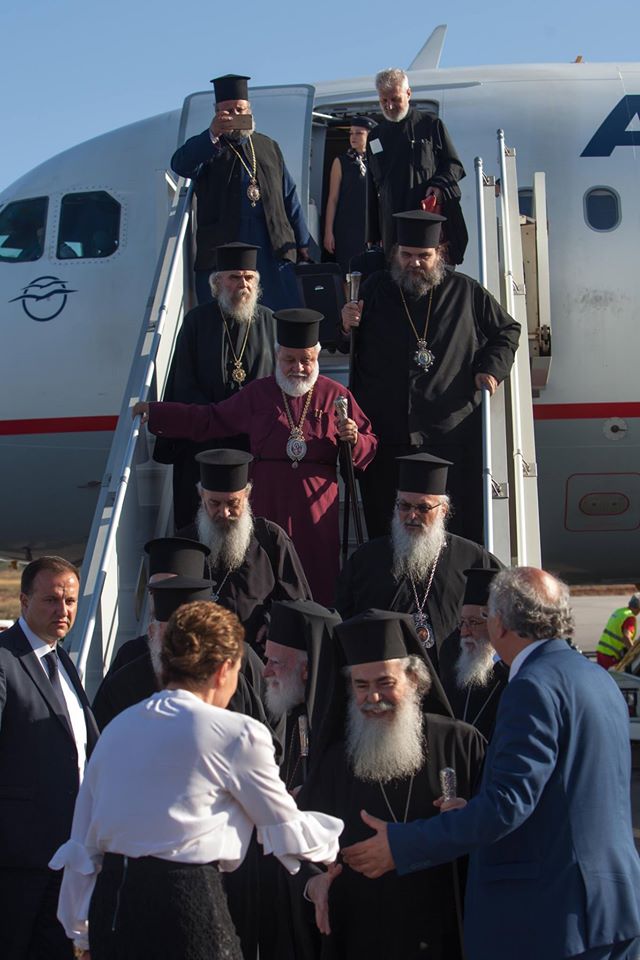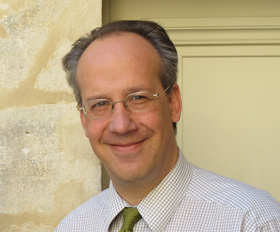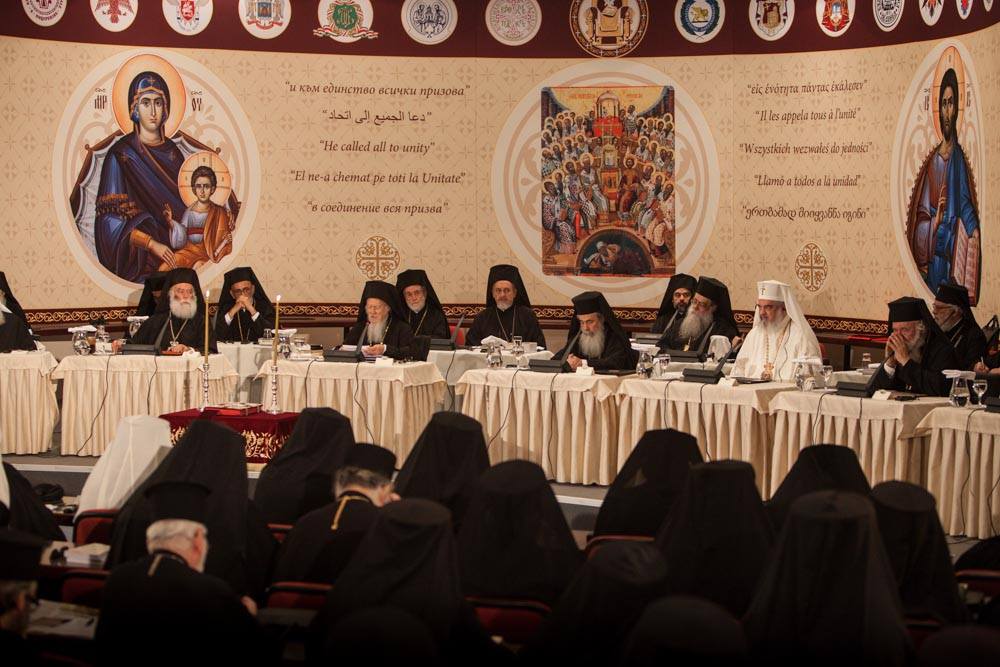
Behind this leadership squabble lurks a growing antagonism not only between the zealot – neo-fundamentalists – and the proselyte movements which are open to ecumenism but also between the proponents of a Byzantine “symphonia” and those opposed to any confusion between the Church and the State.
Even more fundamentally, this schism will be the result of a struggle between those who advocate a return to the Soviet civilization, “based on the moral foundations of Christianity” according to Patriarch Kirill, and those who oppose the expansionist ambitions of Russia and consider the Soviet regime to be totalitarian and anti-Christian (Patriarch Kirill is opposed to the thesis that Russia was the aggressor in Ukraine and, on March 2016 affirmed that the pope agreed with him on that point.)
This was after all 14 Churches, without exception, had accepted, in January of 2016, the communique of the conference of Chambesy announcing that the Council would be held for the Orthodox Feast of Pentecost, 19 June 2016. The Ecumenical Patriarch, confronted with this challenge to his leadership 15 days prior to the event, maintained that the “Great and Holy Council” would still take place and declared that its decisions would be binding for the whole Orthodox Church. The Patriarchate of Moscow let it be known that it would not be able to accept the decisions of the Council.
Last February there were signs of difficulties in the preparations for the Council; a lack of consensus in the pre-council preparatory commissions and an awareness of the risks involved in some of the decisions made at Chambesy especially those concerning procedural regulations.

But it was also pointed out that, in spite of what some observers were saying, the importance of such a council is not a novelty since, at least until the 17th century, the Orthodox Churches succeeded in getting together, over and above their national affinities. The debate which followed within the Orthodox world made the Churches clarify their positions. But the silence about the Russian-Ukrainian war and concerning the claim of autocephaly on the part of the second largest Orthodox Church in the world, the Ukrainian Orthodox Church, won out over the pre-council preparatory process. (The Ukrainian Orthodox Church has 25 million members, separated into three different Orthodox Churches. This makes it the second largest Christian Orthodox Church nation after Russia with its 58 millions of faithful.)
Indeed, after certain declarations of the Patriarchate of Moscow which wrongly affirmed that an “agreement has been reached that Ukraine belongs to the canonical territory of the Patriarchate of Moscow,” Father John Chryssavgis, a high official of the Ecumenical Patriarchate, clearly denounced these statements on March 2. He clarified that Patriarch Bartholomew had not renounced “his canonical and historical right to respond to the needs of the Christians of Ukraine as a daughter Church of Constantinople.”In the middle of Russian-Ukrainian war, neither the Kremlin nor the Russian Church can afford to lose their faithful in Ukraine.
According to Deacon Andrey Kurayev, one of the most popular theologians of the Russian Church, there can be no doubt that this declaration led the Patriarch of Moscow to revise his decision to assist the Council which he had announced in January. In the middle of Russian-Ukrainian war, neither the Kremlin nor the Russian Church can afford to lose their faithful in Ukraine. But this is what would most certainly happen if Constantinople recognized the patriarchate of Kiev, an Orthodox Church which came into being in 1991 and which, in spite of having the greatest number of adherents, has not been recognized by any Orthodox Church.
Another blogger who is popular in Russia, Alexander Soldatov, affirms that the decisions taken by the Bulgarian, Antiochian, and Georgian Churches were instigated by Moscow by stirring up the smoldering ashes of orthodox fundamentalism. He states specifically that the decision made on June 1 by the Bulgarian Church not to go to Crete followed the canonization, on May 28, at Sophia and in conjunction with the patriarchate of Moscow, of Mgr. Serafim Sobolev, an anti-ecumenical and ultra-conservative bishop. The visit of Patriarch Kirill and Vladimir Putin to Mount Athos at the end of May had exactly the same effect since, a few days later, the monks of this peninsula, who are very influential in Greece, vigorously rejected the pre-council working documents.
The Church of Antioch which, historically, has been close to the Russian Church, took advantage of the situation to announce its decision not to go to Crete. In this context, Damascus would have a better chance of promoting the priority of its claims on the jurisdiction over Qatar (a territory it disputes with the Church of Jerusalem) on the six themes on the Council’s agenda. Finally, there is the refusal of the Church of Georgia, announced by the news agency TASS, which is traditionally hostile to ecumenism and frustrated because its rank in the hierarchy of Churches was not put on the agenda of the Council.
The representatives of the Ecumenical Patriarchate voiced their profound deception, reminding the participants that at Chambesy all the Churches had agreed to hold the Council in June and pointing out that everything had been done to facilitate the participation of all the Churches at the Council, even moving the site of the Council from Türkiye to Greece according to a petition of the Russian Church… But the very same day, Father Vsevolod Tchaplin, Patriarch Kirill’s right-hand man for 5 years, (deprived of his functions since December 2015 for having called for a holy war in Syria), not only approved this decision of the Russian Church but linked it to apocalyptic happenings because, according to him, the number of the Beast, 666, is found inscribed in the agenda of the Council:
“Now that the ‘Council of Bartholomew’ is going to take place in the absence of 5 Churches which represent the absolute majority of the Orthodox world, there is justification for considering it illegitimate and to judge, cost what it may, the principle fanatics who organized it. If, through them, the document on the acceptance of ecumenism and the participation [of the Orthodox Church] in the World Council of Churches passes, it is entirely possible to consider it as an act of highway robbery. Everything that is happening is normal. The hour of truth has arrived. There is no divine blessing on the Council of 16-06-06.”
The ecumenical friends of the Orthodox Church, caught up in this crisis in spite of themselves, are also going to have to make a choice. Either they will continue to give priority to what still remains of unity and openness towards the ecumenical movement within this Church and, in this case, they should then firmly support the conciliar process undertaken by Patriarch Bartholomew with a view to treating the numerous wounds of these Churches which have remained faithful (as the Holy See announced when it confirmed that a delegation presided by Cardinal Koch would be sent to Crete).
Or they will decide to favor the powerful Russian Church in order to preserve a dialogue with it, particularly by helping it to emerge from its neo-fundamentalist rut. But the importance of this Church should not be over-exaggerated since, in spite of its weight, it only represents a third of the Orthodox faithful (58 million adherents in Russia, to which can be added 12 million faithful in Ukraine, 4 million in Belarus and another million abroad which makes a total of 75 million compared to 274 million of Orthodox adherents in the world – counting the Oriental Orthodox Churches.). Also, its reputation in Russia has gone downhill as can be seen from the number of those participating in its offices.
In both cases, we must remember that, according to the Gospel, the reconciliation among Christians is only possible through love and truth.
 Antoine Arjakovsky is an Orthodox historian and the author of several books on Orthodox Christianity. In 2013, he published En attendant le Concile de l’Église orthodoxe, which has been translated into Ukrainian and Russian, and Qu’est-ce que l’orthodoxie? which is soon to be published in English. In 2004-2011, he was the director of the Institute of Ecumenical Studies of the Ukrainian Catholic University.
Antoine Arjakovsky is an Orthodox historian and the author of several books on Orthodox Christianity. In 2013, he published En attendant le Concile de l’Église orthodoxe, which has been translated into Ukrainian and Russian, and Qu’est-ce que l’orthodoxie? which is soon to be published in English. In 2004-2011, he was the director of the Institute of Ecumenical Studies of the Ukrainian Catholic University.Related:
- Orthodox world heading toward a new schism
- Moscow worried about emergence of a new Ukrainian national church
- Poroshenko meets with the Patriarch of Constantinople
- Kirill wants a ‘guarantee’ from Pope in his war against Church in Ukraine, Kholmogorov says
- Pro-Russia militants in occupied eastern Ukraine torture protestant pastor to convert to Russian Orthodox Church
- Ukraine and the Orthodox Taliban
- Ukrainian Orthodox Church of Kyiv Patriarchate in Crimea evicted from Cathedral
- The Russian Orthodox Church of the Moscow Patriarchate resembles the CPSU of Soviet times
- Russian Orthodox Church returning to Soviet-era norms, Bychkov says
- Moscow Patriarchate beefs up its staff for hybrid operations against Ukraine


